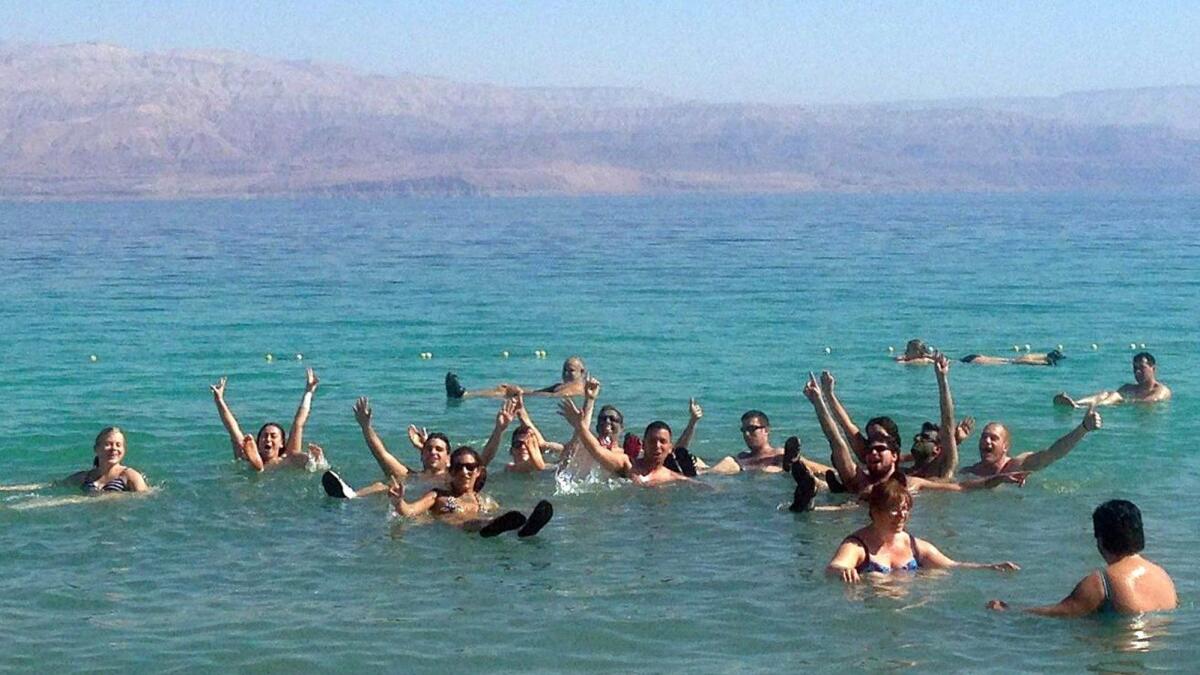Op-Ed: Birthright Israel needs to reconsider its approach — or risk losing more American Jews

- Share via
Birthright Israel, the largest educational tourism organization in the world, has provided free 10-day trips to Israel for more than 650,000 young Jews since 1999. Its mission: “to ensure the future of the Jewish people by strengthening Jewish identity, Jewish communities and connections with Israel.”
But beginning last summer, the program has endured a series of protests for failing to provide a complete picture of Israel’s conflict with Palestinians. During these protests, coordinated by the American activist group IfNotNow, participants interrupt Birthright trips to criticize the content. Then they walk off.
In response, Birthright amended its trip contract to ban attempts to “hijack a discussion” or “create an unwarranted provocation.” In December, three participants were expelled from a trip. Their crime: asking too many questions about the wall separating Israel from the West Bank.
Birthright sends young Jews home emotionally tied to Israel but ill-equipped to defend it in the public sphere.
The protests are new, but Birthright’s shortcomings are not. They’ve hardly changed since my own trip in June 2008. The organization claims to offer a “nonpolitical” experience. But what I experienced was less an aversion to politics than a total avoidance of current events and historical context.
There was virtually no mention of the West Bank, checkpoints or life in the occupied territories. There was hardly any explanation of pre- and post-1967 boundaries. And there was scant discussion about the differences between West Jerusalem and East Jerusalem, or Hamas and the Palestinian Authority.
I wanted to learn about these issues, so that I could advocate for Israel at home. But when I asked substantive questions, the trip leader brushed me off. It was more convenient to stick to the scripted programming.
What Birthright did deliver was an enriching and memorable trip. We hiked Masada, the mountain where Jewish rebels resisted the Roman army. We toured the Old City and stood at the Western Wall. We floated in the Dead Sea and canoed in the Jordan River. We bonded with Israeli soldiers our age. We danced in a Tel Aviv nightclub, visited Rabin Square and stayed overnight at a kibbutz.
I felt enduringly closer to Israel because of the trip. But the program insulted our intelligence. Birthright operates in a sanitized bubble, free of complexity. It sends young Jews home emotionally tied to Israel but ill-equipped to defend it in the public sphere.
Arabs account for 20% of Israel’s population, yet the only exposure we got to Israeli Arabs was when we rode camels at a Bedouin outpost in the desert. If participants don’t meet Israeli Arabs, and hear nothing of the Palestinians, how can they be expected to understand the contours of the region?
By pushing an unnuanced program devoid of context, Birthright has brought the protests on itself. Birthright caters to the right and resists the left. In doing so, it fails to educate and prepare the moderate, pro-Israel center.
In one recent protest, a participant asked why Birthright’s maps don’t identify the West Bank. The guide could have explained that 2.3 million Palestinians live in the West Bank; that Israel has controlled the territory since 1967; and that Israelis disagree about what the territory’s status should be in a future peace agreement. He could have said that Israelis have security concerns about a possible withdrawal, particularly given Hamas’ takeover of the Gaza Strip after Israel’s 2005 withdrawal from that territory.
Instead, the guide simply repeated, over and over, “The West Bank is part of Israel.” That answer is unhelpful. It’s also condescending and shortsighted.
According to a 2013 Pew study, younger American Jews are less likely than older Jews to have an emotional attachment to Israel. A 2018 study by the Jewish Community Federation of San Francisco found that only 44% of Jews between the ages of 18 and 34 consider the idea of a Jewish state “very important.” And a 2017 Stanford study revealed that Jewish students are increasingly opting out of discussions about Israel, finding that Israel’s politics and policies “often contradict their own political values.”
As the prism through which 40,000 young diaspora Jews experience Israel every year, Birthright should find these trends alarming and take the lead in addressing them — by providing a complete, objective picture of Israel. Participants are mature enough to handle it.
Enter the Fray: First takes on the news of the minute »
At the end of my trip, one participant stood up and asked, respectfully, why there had been no mention of the Palestinians. The questioner wasn’t pushing a political agenda; he was simply curious. The trip organizer responded by excoriating him: “So you care about the Palestinians more than you care about your own people!” The rest of us, college students succumbing to a pack mentality, cheered the organizer and shamed the questioner. I’m sorry we did that.
It took years of post-trip reflection for me to clearly see Birthright’s weaknesses. The current generation of Birthright participants is bringing a more active, critical eye to the experience. I don’t agree with their decision to disrupt trips, and I don’t want to see the protests used for an anti-Israel agenda. But for pushing Birthright to be better, the protesters deserve admiration.
Birthright is a generous and valuable gift. But the program must reconsider its approach, or it risks failing the next generation of American Jews.
Judd Olanoff is an MBA student at Stanford and an MPA student at Harvard.
Follow the Opinion section on Twitter @latimesopinion or Facebook
More to Read
A cure for the common opinion
Get thought-provoking perspectives with our weekly newsletter.
You may occasionally receive promotional content from the Los Angeles Times.










